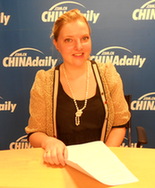當(dāng)前位置: Language Tips> 新聞播報
分享到
The London Olympics are set to be liked, tweeted, pinned and shared with more people than ever before as athletes, fans and organizers interact online in the first social media Summer Olympics.
Sportspeople and those overseeing the event are using social networks to communicate with legions of netizens - mainly on Twitter, which has 140 million active users, and the 901-million-strong Facebook community.
But the sheer scale of this relatively new medium has brought up a host of challenges for organizers and national teams.
Already athletes have been given social media bans and juicy details of the opening ceremony have leaked online.
"This is going to be absolutely huge," said Ian Maude, an Internet analyst at research group Enders Analysis.
"Pretty much every event is going to be broadcast live, streamed to the Internet and a lot of that is going to end up being shared with friends, linked to, discussed on social media platforms- far more so than anything before."
In the four years since the Beijing Olympics, the global number of social media users has exploded, as has the amount of people with smart phones.
As such, the London event will generate unprecedented scrutiny - a fact the International Olympic Committee (IOC) is capitalizing on with initiatives, such as a social media hub that links Internet users with athletes.
Olympians themselves are commenting online in real time on their social media pages, allowing regular people to get an insight into their lives - and sometimes characters - in a way that was not previously possible.
US hurdler Lolo Jones, for instance, is huge on Twitter thanks to a mix of funny comments, interaction with her 168,500-plus followers and juicy announcements - such as her revelation that she is a virgin.
"Sports fans are behaving in a new way - they are increasingly using social media to follow sport," said Charlotte Lesage, spokeswoman for Synthesio, a social media monitoring firm.
"It brings a certain proximity to and intimacy with the athlete."
But the very public medium has its flipside and athletes have already blundered.
Australian swimmers Nick D'Arcy and Kenrick Monk have been slapped with a one-month social media ban by their country's delegation after they posted photos of themselves posing with guns while training in the United States.
The pair will be sent home right after their events at the Games, with the Australian Olympic Committee ruling "their conduct brought themselves into disrepute".
Swimming star Michael Phelps also caused a stir when he criticized the new Olympics swimming cap on his social media account.
US hurdler Kerron Clement, meanwhile, got more than he bargained for when his tweet complaining that it took hours to get to his London living quarters from the airport went viral.
"Athletes are sleepy, hungry and need to pee," he complained on July 16.
Darryl Seibel, spokesman for Team GB, conceded that communication blunders may be made during the Games, adding that while athletes had for the first time been briefed about social media, they had not been given do's and dont's.
"We're taking a fairly liberated approach, with the full knowledge that it will be imperfect, there will be some bumps and bruises along the way. But, generally speaking, we think it will be positive," he said.
For organizers, too, social media has caused a headache.
Details and photos of the opening ceremony were leaked online after the show's technical rehearsal Monday, despite director Danny Boyle's plea for spectators to "save the surprise".
"Whatever your expectations are, forget them! It's beautiful," said Mims Reilly in one of the less-revealing posts.
The IOC has had to lay down some rules, partly to protect official Olympic sponsors.
Participants have been told not to promote non-official brands for one month, prompting a rush of online praise for sponsors just before the ban kicked off last week - all of which was covered by an amused press.
In one such example, Lucy Macgregor, Annie Lush and Kate Macgregor - who represent Britain in sailing - thanked a host of brands on their Facebook page before the ban began.
Overall though, organizers and sporting delegations are banking on social media to promote the Olympics like never before.
"We think it's a very powerful medium to reach new and different audiences, in particular to reach young people," Seibel said. "And, of course, the long-term growth and health of the Olympic movement is contingent in part on our ability to reach out to young people."
(中國日報網(wǎng)英語點津 Helen 編輯)

About the broadcaster:

CJ Henderson is a foreign expert for China Daily's online culture department. CJ is a graduate of the University of Sydney where she completed a Bachelors degree in Media and Communications, Government and International Relations, and American Studies. CJ has four years of experience working across media platforms, including work for 21st Century Newspapers in Beijing, and a variety of media in Australia and the US.
分享到
關(guān)注和訂閱


翻譯
關(guān)于我們 | 聯(lián)系方式 | 招聘信息
電話:8610-84883645
傳真:8610-84883500
Email: languagetips@chinadaily.com.cn